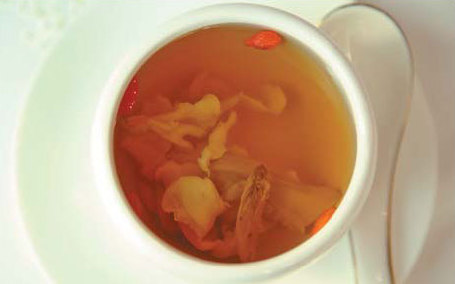Calm the soul, clear the broth
Updated: 2012-12-02 08:00
By Pauline D. Loh (China Daily)
|
|||||||||||
The most primeval form of cooking in China was roasting over an open fire. It was not too long before the first ancient cooks discovered the combination of fire and water. By placing water in a skin hung over an open fire, they discovered that boiling water cooked food evenly and without scorching. That was the first soup and stew.
Modern cooks have it a lot easier. They don't have to send their husbands out hunting so they can get a skin to hang over the fire, In fact, there are a lot of high-tech containers now that allow you to throw all the ingredients together, turn on a timer and forget it all until dinner time.
But being very Cantonese, I prefer the good old-fashioned stovetop method. It is a sensuous experience I would not exchange for all the gadgets in the world. Skimming the froth from the first boil is almost a therapeutic experience, a cleansing process that calms the soul and clears the broth.
And as the soup slowly simmers on the stove, it sends out sensory signals that it is slowly turning from plain water into a delicious tonic. The savory scent from the kitchen announces to family, and neighbors, that a treat is in the making - a sort of epicurean foreplay.
In winter especially, a simmering pot also steams up the kitchen and warms the house. In the arid cold of a Beijing winter, cooking a soup can also be a spa facial.
Now for the ingredients.
Chicken, pork ribs, lamb short ribs, beef, turtle - the heartier meats are the choices of the season. As for the last, these are Chinese soft-shell turtles that are specially bred for food. They are about 1 kg in weight and available from good seafood markets. As my mother used to say, do not make friends with your food.
The Chinese home cook also knows to pair seasonal ingredients with the meat base, and these may include Chinese herbs, root vegetables or dried berries used in traditional Chinese medicine.
Every ingredient has a function, whether it is to dispel the gamy smell of the meat, or to balance the yang with the yin, and vice versa. Some is added purely for the taste.
For example, fresh walnut meat is used in a chicken soup, adding a nuttiness to the broth. The walnuts will still be soft and milky from the autumn harvest.
This broth not only nourishes the body, but the walnut is also supposed to give a boost to brainpower, and is therefore a favorite ingredient for mothers with young children.
Dried Chinese angelica root (danggui)may be used in the turtle soup, to add to the value of this nourishing soup. This is often regarded as a "women's soup", since it is very rich in natural collagen, and angelica is regarded as a "women's herb" that will cure a multitude of female complaints. It also induces a hormonal surge from the phytoestrogen in the herb.
For the man in the family, it is usually a hearty lamb soup to warm the body, and some say the libido. Organic lamb ribs are simply stewed with huge bunches of Shandong green onions, plenty of ginger, and very little else. This is an all-natural winter tonic that has its origins in the Mongolian grasslands.
Further south where I come from, my mother swears by the restorative powers of a conch and chicken soup, with maybe some panax ginseng added.
The conch comes dried and must be soaked overnight to soften before being cooked with chicken. You may also use frozen conch, but the result is a milky broth that is wondrously sweet.
And finally, there is a classic pork rib soup that is a treasured recipe all year round, cooked with good spicy white peppercorns and plenty of garlic. You may know it as the Singapore-Malaysian street food dish of bak kut teh, but its origin is all Chinese.
Here are all the recipes to keep you going from winter through spring. If you have queries, feel free to e-mail me at paulined@chinadaily.com.cn.
Today's Top News
Rescuers race against time for quake victims
Telecom workers restore links
Coal mine blast kills 18 in Jilin
Intl scholarship puts China on the map
More bird flu patients discharged
Gold loses sheen, but still a safe bet
US 'turns blind eye to human rights'
Telecom workers restore links
Hot Topics
Lunar probe , China growth forecasts, Emission rules get tougher, China seen through 'colored lens', International board,
Editor's Picks

|

|

|

|

|

|






